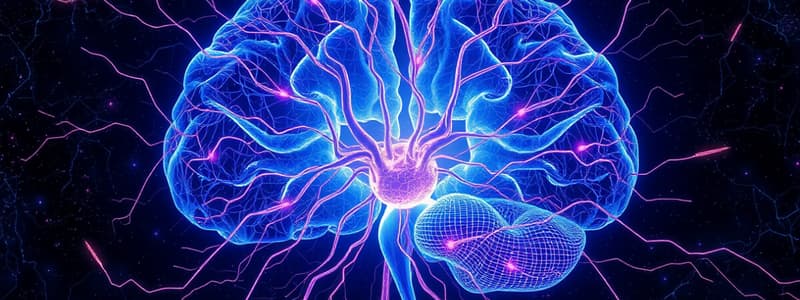Podcast
Questions and Answers
What is the Arachnoid Mater?
What is the Arachnoid Mater?
- Interposed between the other two meninges; separated by subarachnoid space (correct)
- Protects the CNS by containing CSF
- A part of the cerebral cortex
- The outermost layer of the meninges
What does the Pia Mater do?
What does the Pia Mater do?
It protects the CNS by containing CSF and covers the surface of the brain.
The Dura Mater envelops the Arachnoid Mater.
The Dura Mater envelops the Arachnoid Mater.
True (A)
What role do Mamillary bodies have?
What role do Mamillary bodies have?
The Infundibulum is a small _____-like stalk.
The Infundibulum is a small _____-like stalk.
What functions does the Hypothalamus control?
What functions does the Hypothalamus control?
What is the main responsibility of the Thalamus?
What is the main responsibility of the Thalamus?
What does the Pineal body/gland produce?
What does the Pineal body/gland produce?
What is the role of the Fornix?
What is the role of the Fornix?
The Diencephalon includes structures like the Hypothalamus and Thalamus.
The Diencephalon includes structures like the Hypothalamus and Thalamus.
What connects the left and right hemispheres of the brain?
What connects the left and right hemispheres of the brain?
What does the Cerebrum control?
What does the Cerebrum control?
Which lobe is responsible for processing visual information?
Which lobe is responsible for processing visual information?
What does the Temporal Lobe process?
What does the Temporal Lobe process?
What information does the Parietal Lobe process?
What information does the Parietal Lobe process?
What functions does the Frontal Lobe regulate?
What functions does the Frontal Lobe regulate?
What is Cerebrospinal Fluid?
What is Cerebrospinal Fluid?
What do the Lateral Ventricles contain?
What do the Lateral Ventricles contain?
What is the function of the Third Ventricle?
What is the function of the Third Ventricle?
What does the Cerebral Aqueduct connect?
What does the Cerebral Aqueduct connect?
What is the main function of the Fourth Ventricle?
What is the main function of the Fourth Ventricle?
What does the Central Canal house?
What does the Central Canal house?
What is the role of the Choroid Plexus?
What is the role of the Choroid Plexus?
Flashcards are hidden until you start studying
Study Notes
Meninges and Protective Structures
- Arachnoid Mater: A web-like structure between the dura mater and pia mater, filled with subarachnoid space; surrounds the brain and spinal cord.
- Pia Mater: Delicate membrane covering the brain's surface; protects the central nervous system (CNS) by containing cerebrospinal fluid (CSF), which cushions the brain and spine.
- Dura Mater: Tough outer layer that envelops the arachnoid mater; supports dural sinuses and helps transport blood from the brain towards the heart.
Brain Structures and Functions
- Mamillary Bodies: Reflex centers associated with the sense of smell and memory; part of the limbic system.
- Infundibulum: Funnel-shaped stalk connecting the pituitary gland to the brain, facilitating hormone delivery.
- Hypothalamus: Regulates essential behaviors such as hunger, thirst, and body temperature.
Thalamus and Pineal Gland
- Thalamus: Processes sensory information; acts as a relay station for sensations and is involved in consciousness and sleep regulation.
- Pineal Body/Gland: Secretes melatonin, regulating circadian rhythms and reproductive hormones.
Memory and Limbic System
- Fornix: C-shaped structure linking the hippocampus with mammillary bodies, crucial for memory formation and recall.
Diencephalon Composition
- Diencephalon: Comprises hypothalamus, thalamus, epithalamus, pineal gland, and subthalamus; relays sensory information and manages autonomic functions of the peripheral nervous system.
Cerebrum and Its Lobes
- Corpus Callosum: Connects the left and right hemispheres of the brain, facilitating communication and neural message transmission.
- Cerebrum: The largest brain part, responsible for higher functions like thought and action, divided into four lobes: frontal, parietal, occipital, and temporal.
Lobe Functions
- Occipital Lobe: Processes visual information received from the eyes.
- Temporal Lobe: Responsible for auditory processing, particularly sounds from the ears.
- Parietal Lobe: Handles sensory processing related to taste, temperature, and touch.
- Frontal Lobe: Responsible for motor functions, problem-solving, memory, language, judgement, and social behaviors.
Cerebrospinal Fluid and Ventricles
- Cerebrospinal Fluid: Clear fluid between the arachnoid and pia mater; cushions and protects the brain while providing mechanical and immunological safeguards.
- Lateral Ventricles: Right and left structures containing CSF that cushions the brain and aids in nutrient circulation and waste removal.
- Third Ventricle: Narrow cavity filled with CSF, located between the brain's hemispheres; involved in nutrient transport and injury protection.
- Cerebral Aqueduct: Connects the third and fourth ventricles of the brain; contains CSF and serves as a passage for fluid flow.
- Fourth Ventricle: Protects the brain from trauma through cushioning; contributes to forming the central canal of the spinal cord.
- Central Canal: Houses the spinal cord within the vertebral column, providing a protective structure for nerve bundles.
- Choroid Plexus: Specialized barrier producing CSF within the cerebral ventricles, forming the blood-CSF barrier critical for homeostasis.
Studying That Suits You
Use AI to generate personalized quizzes and flashcards to suit your learning preferences.




